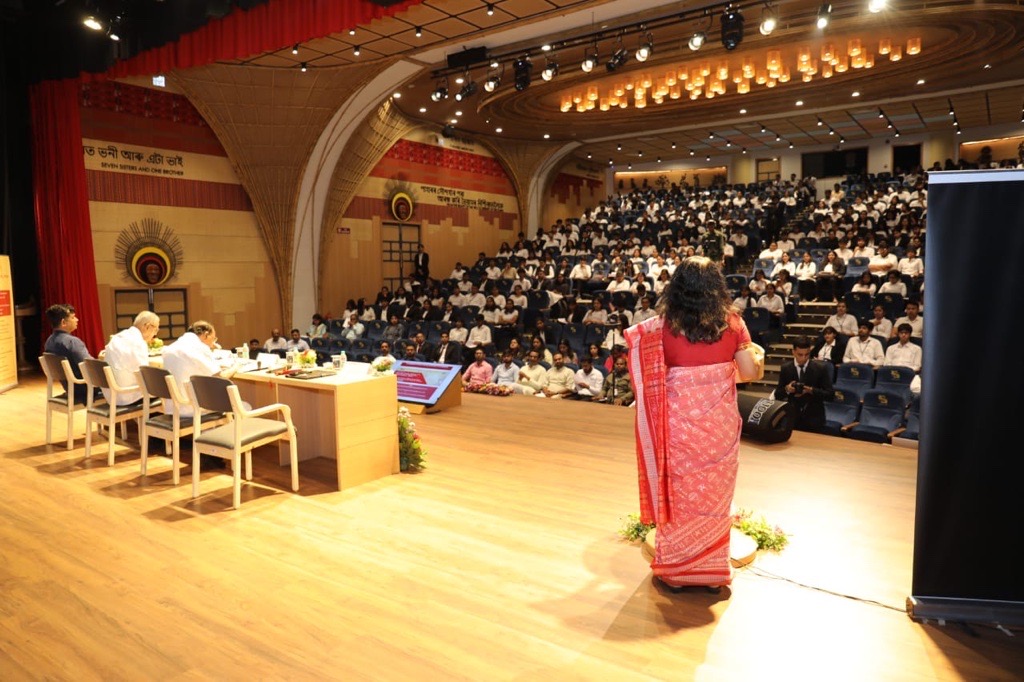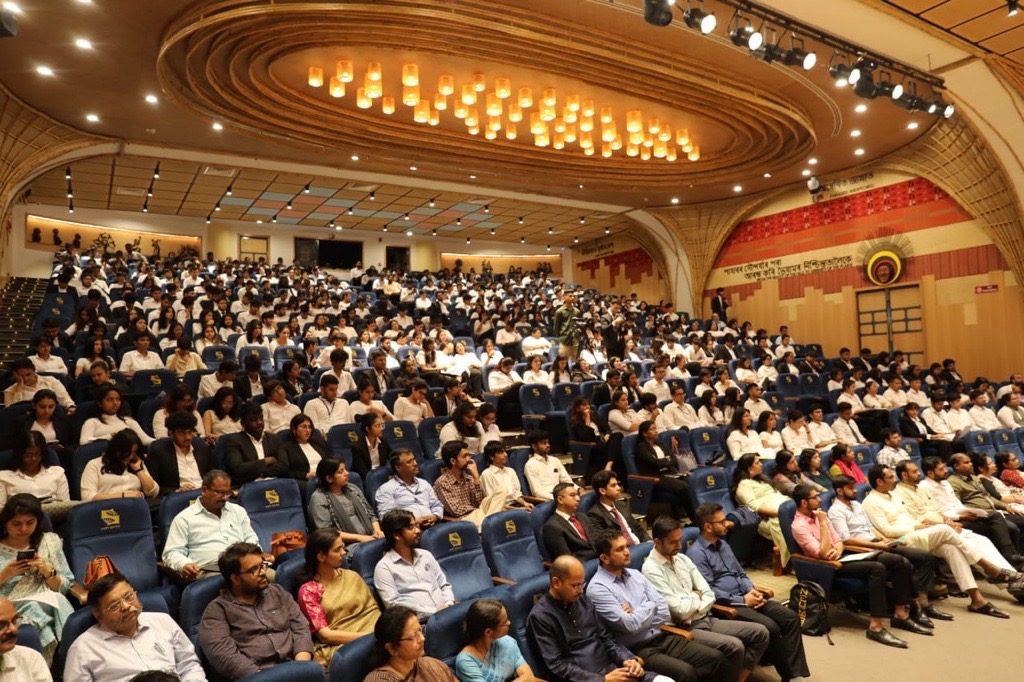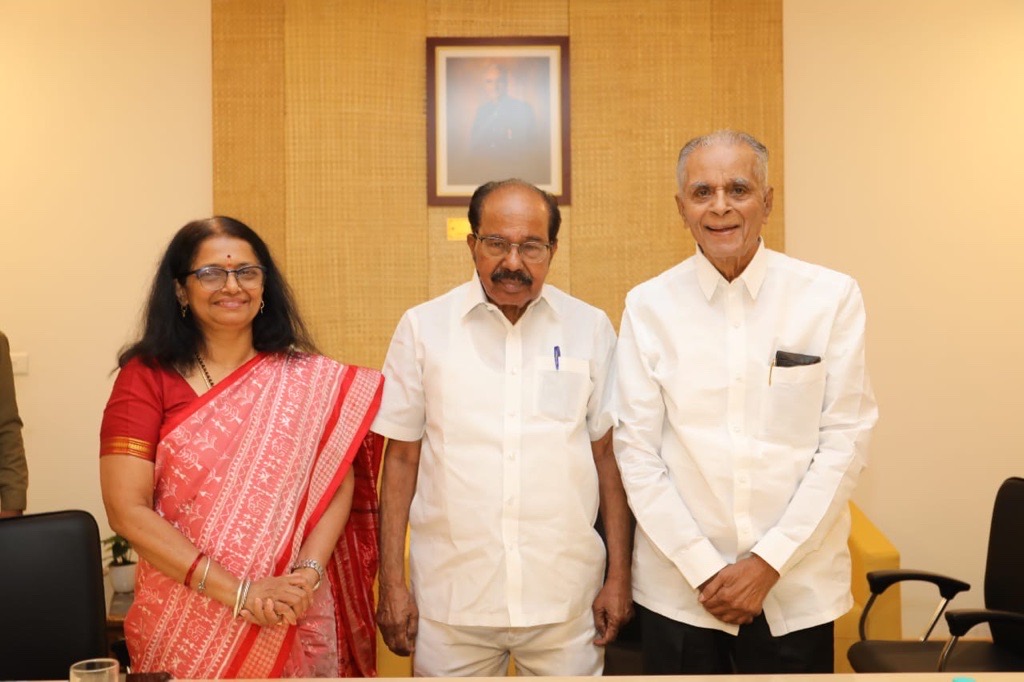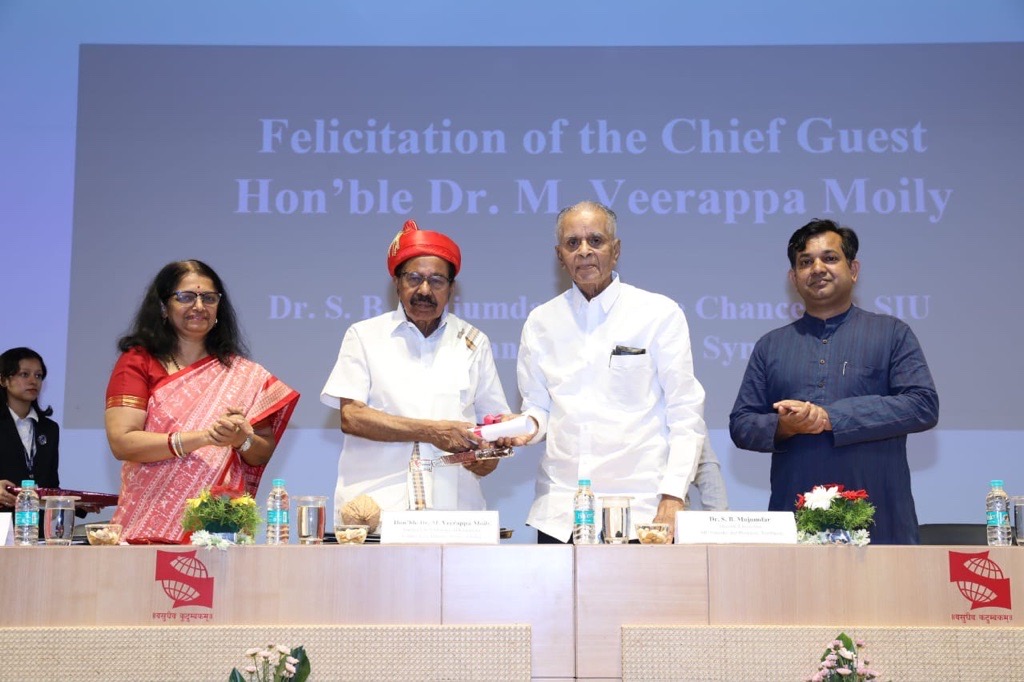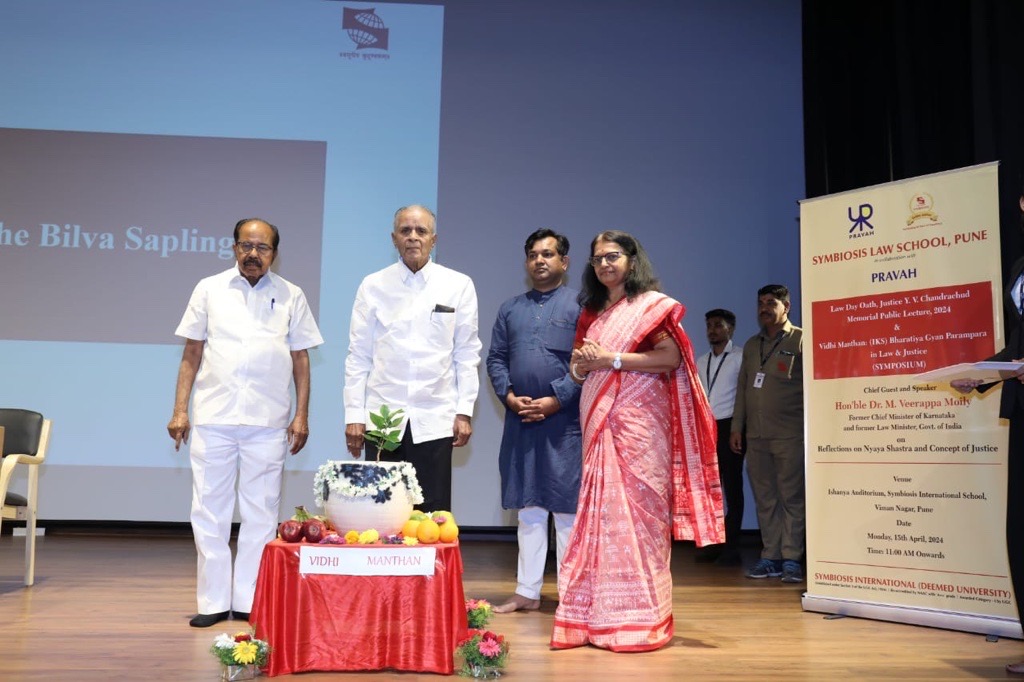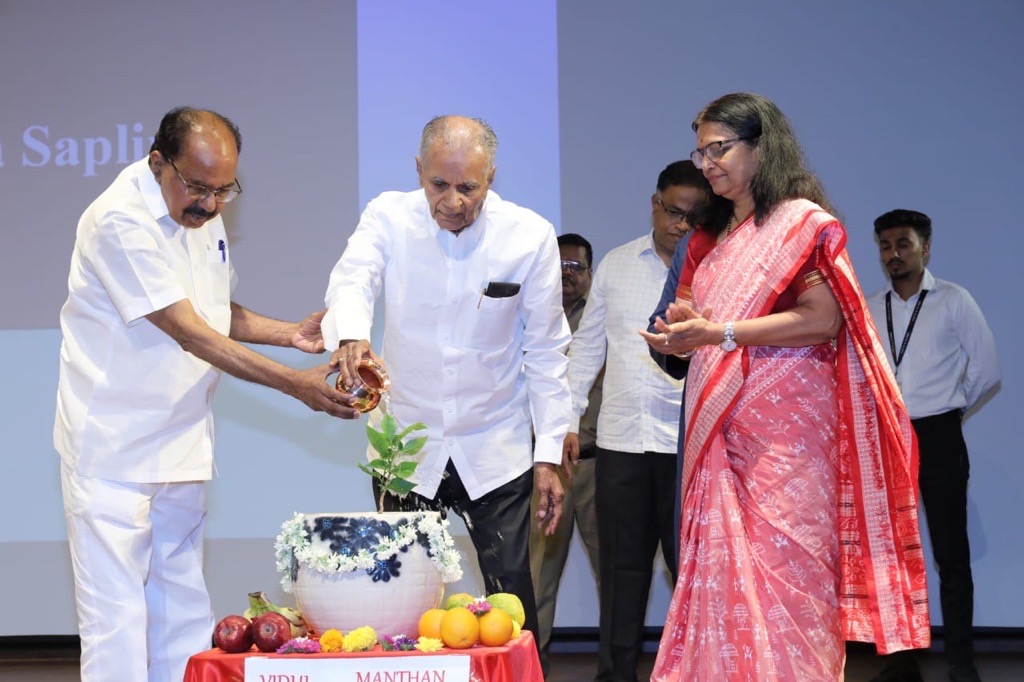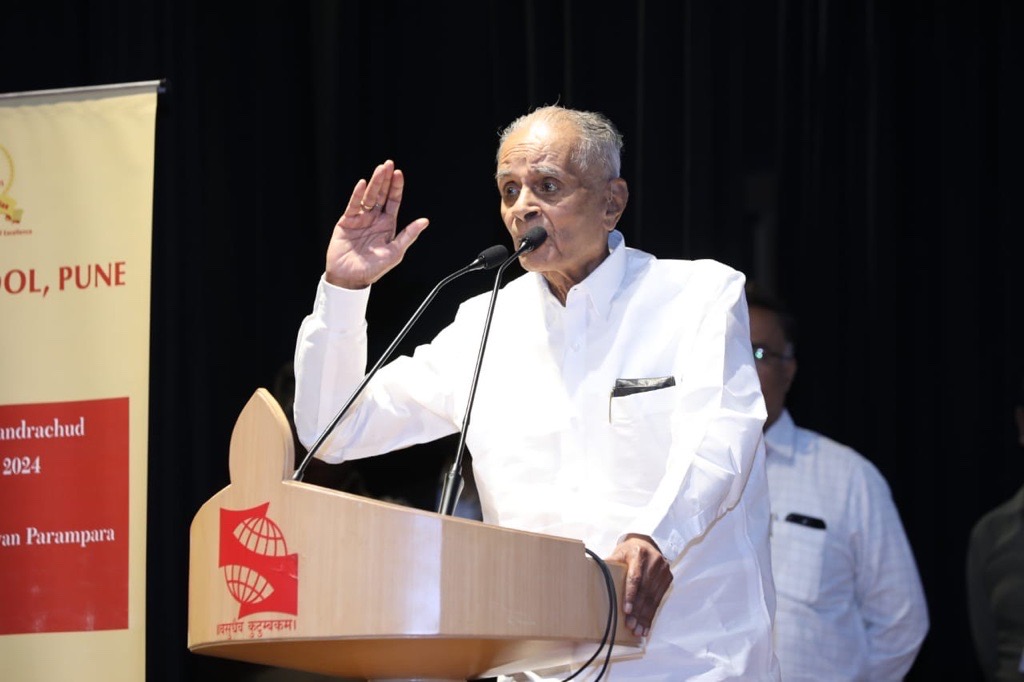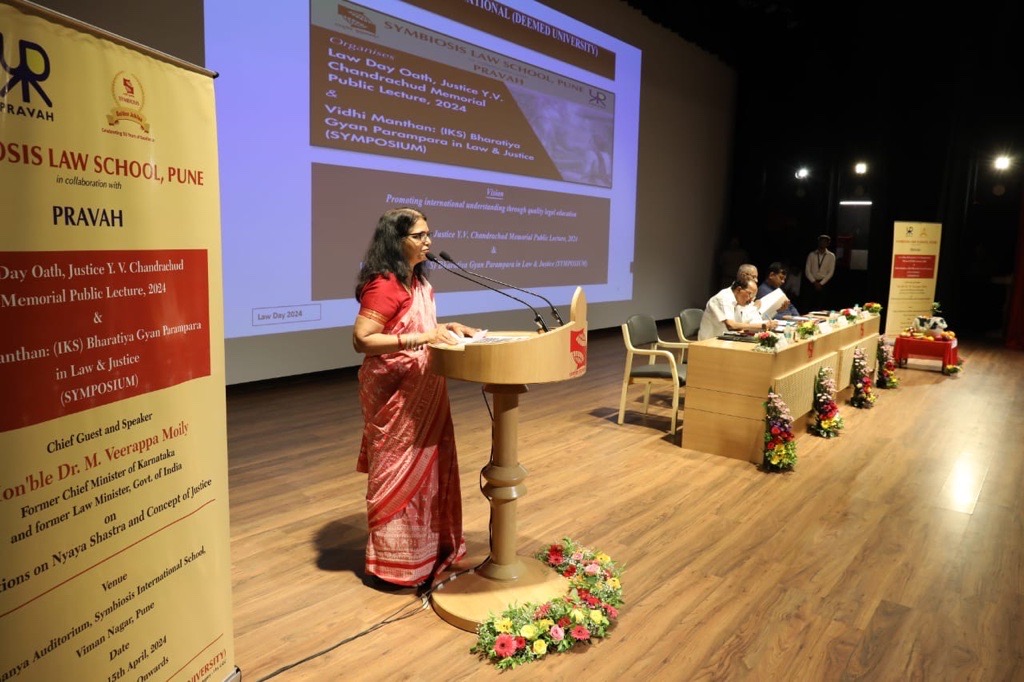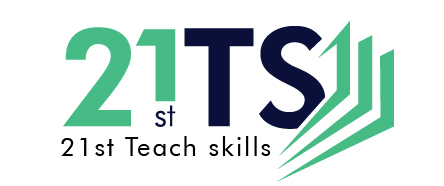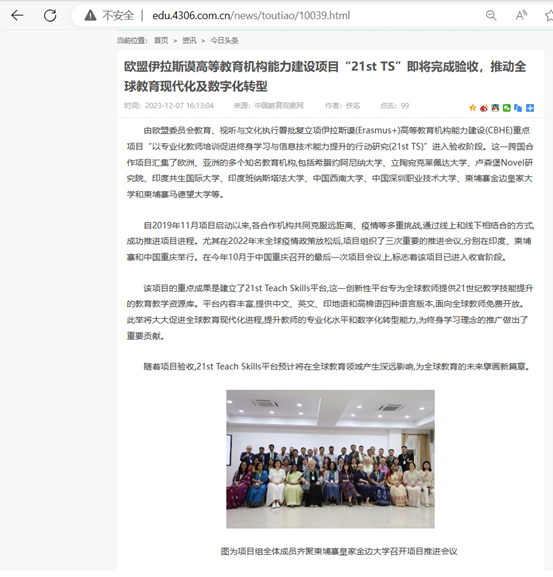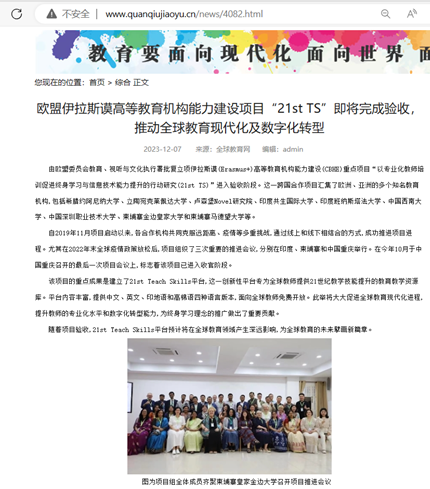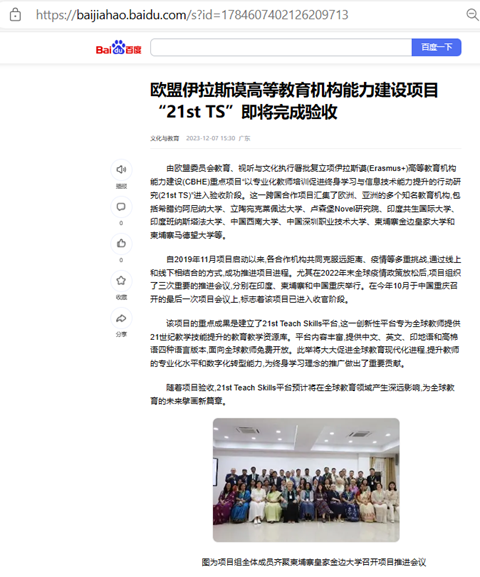Introduction
Symbiosis International University is a partner in the Erasmus+ CBHE Project 21st TS ("Teacher training with specialization on life and information technology skills"). As a part of the project deliverables, Project Team members of Symbiosis International University, Dr. Shashikala Gurpur (Project Manager for SIU), Dr. Aparajita Mohanty, Dr. Bindu Ronald, Dr. Raj Varma, Dr. Ujwal Nandekar, Prof. Kshitij Naikade visited SWU, Chongqing, China from 1st October to 5th October 2023.
The study visit consisted of discussing the progress and achievements of the project and its various Work Packages like accreditation, dissemination, development etc. especially since the Project was nearing completion. One of the main agenda items was the delivery of the capacity building program developed by Klaipeda University. This capacity building program was intended to develop skills in potential trainers to better equip them to deliver the educational program to the intended audience of pre-service and in-service teachers.

SIU team at the 4th Study Visit. The participants on behalf of SIU are: Dr. Ujwal Nandekar, Dr. Aparajita Mohanty. Dr. Bindu Ronald, Dr. Shashikala Gurpur, Prof. Kshitij Naikade and Dr. Raj Varma (R to L)
The capacity building programme under the 4th Study visit was an enriching experience which involved training activities with colleagues sitting and working in groups. Individual teams from each country worked as teams on the Practical activities, filling questionnaires and involving in game-based learning. Trainings provided by the Novel group helped the participating institutions to review the work they had earlier done in preparing videos and study material and re-working on them to make them more interesting incorporating interactive tools with the help of AI, voice over, visual graphics and smart-arts. Presentations were made by partner institutions on their respective deliverables

Group Photo of all participants of the 4th Study visit consisting of University of Ioannina, Greece; South West University, China; Shenzhen Polytechnic, China; Klaipeda University, Lithuania; Novel Group, Luxembourg; Symbiosis International (Deemed University), India; Banasthali Vidyapith, India; Royal University of Phnom Penh, Cambodia; University of Battambang, Cambodia
Cross Culture Enrichment: The Soft Power of Learning

Dr. Shashikala Gurpur, Director, SLS Pune, Dean FOL, SIU, Project Manager 21TS SIU addressing the participants of the study visit during the press conference.
India and China are two ancient civilisations and they also share certain cultural similarities. Inspite of China and India being diverse in many respects they also have certain shared values which include respect for tradition, family and community sense, a deep rooted history of religious, and philosophical traditions. The study visit was a platform through which the participants could experience this. Our visit to the Dazu caves showed us the similarities in the religious and philosophical values and practices between the two countries. India and China share a range of philosophies especially of Buddhism and both cultures lay a huge emphasis onseeking wisdom from ancient religious and philosophical teachings. As a part of cultural exchange, the participants of this study visit were taken to Dazu Caves which is a UNESCO world heritage site. These caves consist of an amazing collection of rock sculptures from the ninth to the thirteenth centuries that can be seen on the steep hillsides of the Dazu region. They stand out for their exceptional artistic quality, their wide range of secular and religious subject matter, and the insight they provide into daily life in China at the time. They offer excellent proof of the harmonic fusion of Confucianism, Taoism, and Buddhism.

Dr. Shashikala Gurpur, & Dr. Aparajita Mohanty, SLS Pune along with Mrs. Lucy Tan, SWU.
At Dazu, Chinese Taoist and Confucian ideas, along with Indian Buddhism, merged to produce a unique and significant example of spiritual harmony. Carvings, which date from the ninth to the thirteenth centuries and represent the pinnacle of Chinese cave temple art, demonstrate not only how peacefully Buddhism, Taoism, and Confucianism coexisted in China but also offer tangible evidence of how cave temple art has come to illuminate daily life. The cultural site's numerous carvings and written historical documents demonstrate the significant evolution of Chinese religious ideas and cave temple art at that time.

Guan Yin literally means “she who looks at the sound (of the cries of the world)” and is the Buddhist deity of mercy. Her thousand hands and eyes are stretched out to the faithful, ready to take on the suffering of the world.
People Matter
Our visit to Dazu Mountain was fascinating. It was also enthralling to see Chinese kids yelling out- “we know Bollywood, we like your country” and parents requesting and posing for selfies with their kids. The excellent hospitality and warmth from Prof. Qyini, Ms. Lucy Tan and Ms. Seagull greatly enhanced our impression of the Study visit. It was interesting to learn about Chinese names and Ms. Tan and Ms. Seagull very patiently explained about Chinese ways and also told us about English meaning of Chinese names. Prof. Qyini’s warm and friendly welcome upon our arrival to his genuine efforts to make each one of us comfortable is praiseworthy. He demonstrated extreme cultural sensitivity by considering the cultural backgrounds of the participants and ensured that all of us were well taken care of and even went out of the way to cater to the specific requirements of vegetarianism of a few participants. The university team led by Prof. Qyini took care of the accommodation and logistics to ensure a smoot stay and also organised guided tour and orientation of the surrounding areas and also organised cultural experiences to enrich the study visit which included traditional Chinese cuisine tastings. There was an inclusive environment created and this left a very positive impression of the host institution and the team. There was personalised attention provided to all. Prof. Qyini also introduced us to the guru power in him in his knowledge of healing.
Similarities
People in China value culture and heritage and this was evident from the large number of people who had come to see the Dazu mountain stone carvings. It was also interesting to note that the little children were speaking English and there was a lot of curiosity in them to learn about us as foreigners who were visiting this heritage site. They were trying to learn about us by striking conversations and asking about us. We could see love and culture as a unifying force connecting the nations.
It was very interesting to note the strong emphasis on collectivism and the sense of community and like in India community and family form an essential part of one’s identity in China. The ability to adapt to the changing circumstances and the resilience that people have are also similar to what is observed in people of India. China is a vast country with a lot of regional flavours and colours and variations. Like in India and in other Asian countries it was observed that Chinese culture places a strong emphasis on family ties and the support of the extended family is significant. We could also see the traditional gender roles being present however it was also interesting to see the dynamics evolving particularly in urban areas and among the younger generations.
After the fruitful day-long engagements at the conference venue the participants explored places near the hotel where we resided during the study visit. It was interesting to see the busy street life with many food joints on the street. Coming out of the hotel also allowed a closer interaction with the people of Chongqing city who were more than welcoming. Although most people did not speak English we found that in spite of the language barrier we were able to communicate with the local people when we went to shop at the nearby shops.
During our stay in Chongqing we also went to local attractions and experienced the lives of people. One such interesting experience was the visit to the massage parlours where we found a number of locals went to de-stress themselves after a tiring day's work. The staff at the massage parlour were inquisitive to know about us and did not shy away from asking personal questions to understand Indians. Although language was a barrier a very friendly fellow customer acted as the translator between us and the staff.India is also known for its ayurvedic massage therapies however unlike what we see and experience in India it was not using oils but through focusing on the pressure points and directly rejuvenating the nerves.
Best Practices
Exploring the streets near the hotel also provided valuable insights on various aspects of China. It was very interesting to see the economic growth of the country and the transformations that have been. China has made extraordinary progress in infrastructure development which includes high speed rail (although the limited time did not give us an opportunity to travel in one of them), the highways and the urban infrastructure. The city has a robust infrastructure to support economic growth. The vehicles on the road, many of which were products made in China, highlighted the efficient and scalable manufacturing and technological capabilities. There is a lot that India can learn from the success of China in leveraging technology to drive economic growth and convenience for the people. It was interesting to see sustainable urban development, efficient city planning, transportation and efficient resource management. The pristine forests, mountains and the river, the green cover all around the city and the suburbs with beautifully landscaped surroundings showed how they address the environment and develop sustainable practices.
The learning from the study visit to Chongqing and South West University went beyond the conference room.
The study visit Chongqing also entailed a visit to the South West University campus located in. It was evident during the visit that the school’s illustrious past is a result of its unwavering commitment to academic innovation and social development integration. SWU offers a wide range of academic programs in philosophy, economics, law, pedagogy, literature, history, science, engineering, agriculture, medicine, management, and the arts. It is one of the "211 Project" and "Double First-class" institutions. Every university across the globe is unique and the insights gained during the visit to South West University definitely contributed to a broader understanding of the higher education practices there. The university also provided an understanding into the programmes, infrastructure, the efforts the University takes to create a harmonious environment for its staff and students from diverse backgrounds. We found Chongqing and the University to be a place where the National scientists are given their due respects and treated at par with the top people in governance.
The study visit provided different experiences and learning and it left a lasting impression in the minds of the participants. Overall, the 4th study visit to SWU, China under the 21st TS Project was a very enriching professional and cultural experience. The capacity building training received, insights acquired by way of cultural visit, interactions beyond the conference room have created a very positive perception which will be disseminated to the learners and stakeholders in the partner countries thereby meeting the objectives of the project.
One world, one universe & one humanity reverberates in such shared moments of joy and gratitude.
